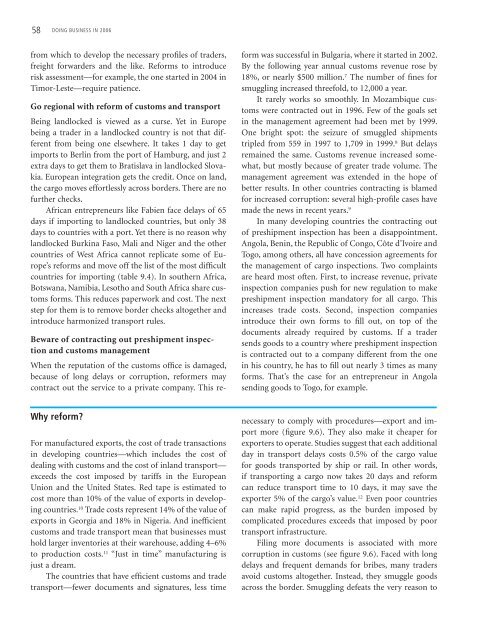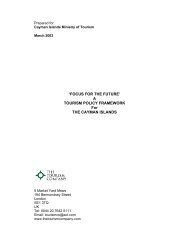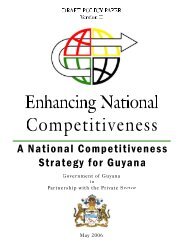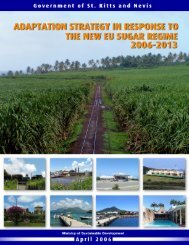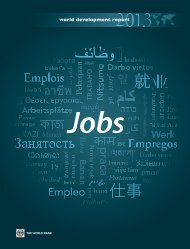Creating
Doing Business in 2006 -- Creating Jobs - Caribbean Elections
Doing Business in 2006 -- Creating Jobs - Caribbean Elections
Create successful ePaper yourself
Turn your PDF publications into a flip-book with our unique Google optimized e-Paper software.
58 DOING BUSINESS IN 2006<br />
from which to develop the necessary profiles of traders,<br />
freight forwarders and the like. Reforms to introduce<br />
risk assessment—for example, the one started in 2004 in<br />
Timor-Leste—require patience.<br />
Go regional with reform of customs and transport<br />
Being landlocked is viewed as a curse. Yet in Europe<br />
being a trader in a landlocked country is not that different<br />
from being one elsewhere. It takes 1 day to get<br />
imports to Berlin from the port of Hamburg, and just 2<br />
extra days to get them to Bratislava in landlocked Slovakia.<br />
European integration gets the credit. Once on land,<br />
the cargo moves effortlessly across borders. There are no<br />
further checks.<br />
African entrepreneurs like Fabien face delays of 65<br />
days if importing to landlocked countries, but only 38<br />
days to countries with a port. Yet there is no reason why<br />
landlocked Burkina Faso, Mali and Niger and the other<br />
countries of West Africa cannot replicate some of Europe’s<br />
reforms and move off the list of the most difficult<br />
countries for importing (table 9.4). In southern Africa,<br />
Botswana, Namibia, Lesotho and South Africa share customs<br />
forms. This reduces paperwork and cost. The next<br />
step for them is to remove border checks altogether and<br />
introduce harmonized transport rules.<br />
Beware of contracting out preshipment inspection<br />
and customs management<br />
When the reputation of the customs office is damaged,<br />
because of long delays or corruption, reformers may<br />
contract out the service to a private company. This reform<br />
was successful in Bulgaria, where it started in 2002.<br />
By the following year annual customs revenue rose by<br />
18%, or nearly $500 million. 7 The number of fines for<br />
smuggling increased threefold, to 12,000 a year.<br />
It rarely works so smoothly. In Mozambique customs<br />
were contracted out in 1996. Few of the goals set<br />
in the management agreement had been met by 1999.<br />
One bright spot: the seizure of smuggled shipments<br />
tripled from 559 in 1997 to 1,709 in 1999. 8 But delays<br />
remained the same. Customs revenue increased somewhat,<br />
but mostly because of greater trade volume. The<br />
management agreement was extended in the hope of<br />
better results. In other countries contracting is blamed<br />
for increased corruption: several high-profile cases have<br />
made the news in recent years. 9<br />
In many developing countries the contracting out<br />
of preshipment inspection has been a disappointment.<br />
Angola, Benin, the Republic of Congo, Côte d’Ivoire and<br />
Togo, among others, all have concession agreements for<br />
the management of cargo inspections. Two complaints<br />
are heard most often. First, to increase revenue, private<br />
inspection companies push for new regulation to make<br />
preshipment inspection mandatory for all cargo. This<br />
increases trade costs. Second, inspection companies<br />
introduce their own forms to fill out, on top of the<br />
documents already required by customs. If a trader<br />
sends goods to a country where preshipment inspection<br />
is contracted out to a company different from the one<br />
in his country, he has to fill out nearly 3 times as many<br />
forms. That’s the case for an entrepreneur in Angola<br />
sending goods to Togo, for example.<br />
Why reform?<br />
For manufactured exports, the cost of trade transactions<br />
in developing countries—which includes the cost of<br />
dealing with customs and the cost of inland transport—<br />
exceeds the cost imposed by tariffs in the European<br />
Union and the United States. Red tape is estimated to<br />
cost more than 10% of the value of exports in developing<br />
countries. 10 Trade costs represent 14% of the value of<br />
exports in Georgia and 18% in Nigeria. And inefficient<br />
customs and trade transport mean that businesses must<br />
hold larger inventories at their warehouse, adding 4–6%<br />
to production costs. 11 “Just in time” manufacturing is<br />
just a dream.<br />
The countries that have efficient customs and trade<br />
transport—fewer documents and signatures, less time<br />
necessary to comply with procedures—export and import<br />
more (figure 9.6). They also make it cheaper for<br />
exporters to operate. Studies suggest that each additional<br />
day in transport delays costs 0.5% of the cargo value<br />
for goods transported by ship or rail. In other words,<br />
if transporting a cargo now takes 20 days and reform<br />
can reduce transport time to 10 days, it may save the<br />
exporter 5% of the cargo’s value. 12 Even poor countries<br />
can make rapid progress, as the burden imposed by<br />
complicated procedures exceeds that imposed by poor<br />
transport infrastructure.<br />
Filing more documents is associated with more<br />
corruption in customs (see figure 9.6). Faced with long<br />
delays and frequent demands for bribes, many traders<br />
avoid customs altogether. Instead, they smuggle goods<br />
across the border. Smuggling defeats the very reason to


